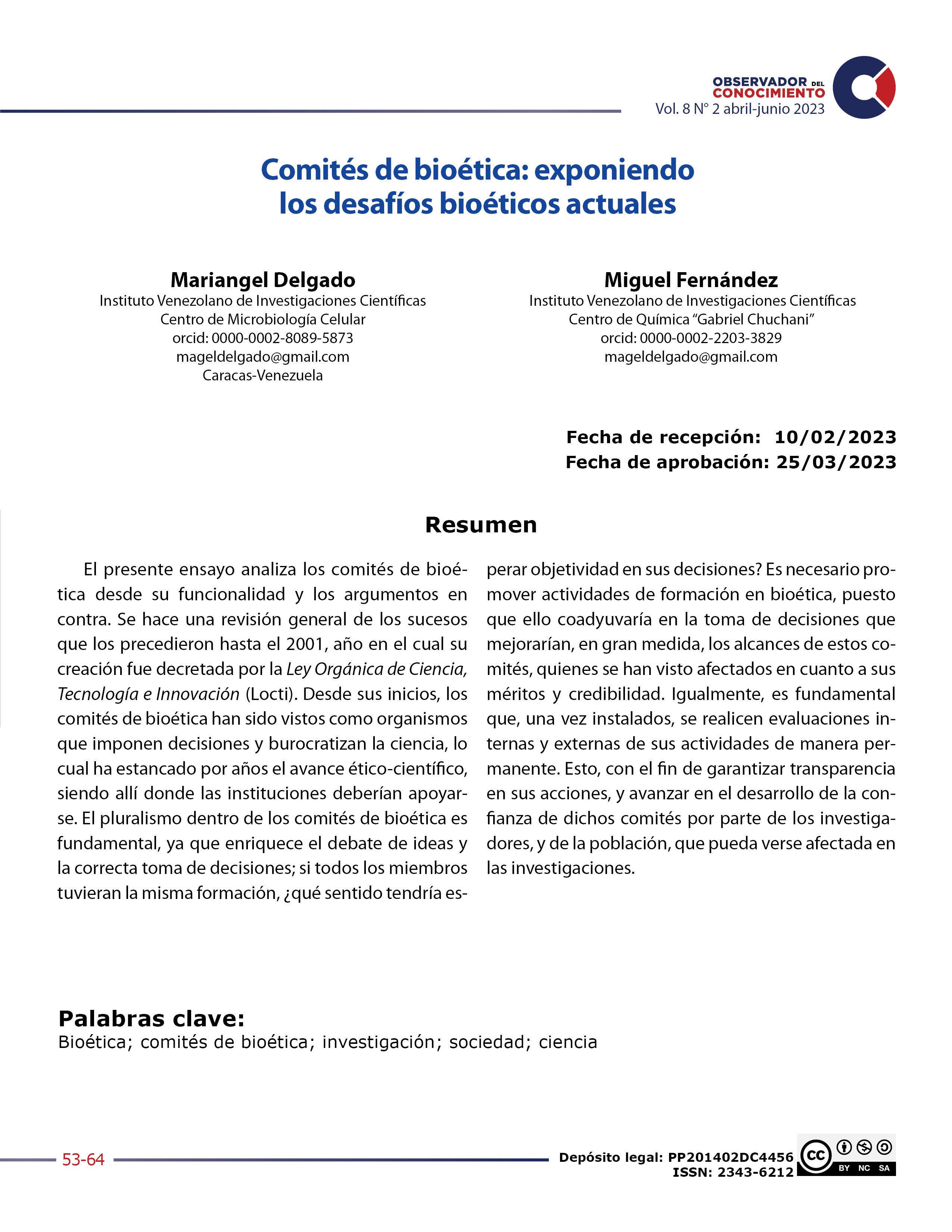Bioethics Committees: Addressing Today's Bioethical Challenges
Keywords:
Bioethics, bioethics committees, research, society, scienceAbstract
This essay analyzes bioethics committees from their functionality and the arguments against them. A general review is made of the events that preceded them until 2001, the year in which their creation was decreed by the Organic Law of Science, Technology and Innovation (Locti). Since their inception, bioethics committees have been seen as bodies that impose decisions and bureaucratize science, which has stalled ethical-scientific progress for years, being there where institutions should be supported. Pluralism within bioethics committees is fundamental, as it enriches the debate of ideas and correct decision-making; if all members had the same training, what would be the point of expecting objectivity in their decisions? It is necessary to promote training activities in bioethics, since this would contribute to decision-making that would greatly improve the scope of these committees, which have been affected in terms of their merits and credibility. Likewise, it is essential that, once installed, internal and external evaluations of their activities are carried out on an ongoing basis. This, in order to guarantee transparency in their actions, and advance in the development of the confidence of these committees on the part of the researchers, and of the population, that may be affected in the investigations.
Downloads
References
Alexander, L. y Ivy, A. (1947). Código de Nuremberg. Recuperado en mayo de 2023 en: http://www.conbioetica-mexico.salud.gob.mx/descargas/pdf/normatividad/normatinternacional/2.INTL._Cod_Nuremberg.pdf.
Bacca, J. (2003). Generalidades de los Comités de Bioética, su utilidad como medio probatorio en los procesos judiciales y éticos. Revista Médico legal, pp. 64-71. enero-marzo.
Cabrera, G. ; Canelas, G.; Becerra, R.; Bulnes, A. y Vargas, (2022). Percepción social de difusión no responsable de información y descalificación científica en COVID-19. Telos, Revista de Estudios Interdisciplinarios en Ciencias Sociales, 24(3), pp. 537-550.
Dadalto, L.; Royo, M. y Costa, B. (2020). Bioética e integridad científica en la investigación clínica sobre Covid-19. Revista Bioética, 28(3), pp. 418-425. https://doi.org/10.1590/1983-80422020283402
Emmanuel, E. (2003). ¿Qué hace que la investigación sea ética? Siete requisitos éticos. En Pautas éticas de investigación en sujetos humanos: nuevas perspectivas, Lolas F. y Quezada A. (ed.). Programa regional de bioética Organización Panamericana de la Salud, Organización Mundial de la Salud, 2003.
Emanuel, E.; Wendler, D.; Killen, J. y Grady, C. (2004). What makes clinical research in developing countries ethical? The benchmarks of ethical research. Journal of Infectious Diseases, 189(5), pp. 930-937.
Ferro, M. (2013). Historia de la Bioética Internacional de la República Bolivariana de Venezuela y en la Facultad de Odontología de la Universidad Central de Venezuela. Acta Odontológica Venezolana, 51 (3 y 4). Recuperado en abril de 2023 en: https://www.actaodontologica.com/ediciones/2013/4/art-6/
García, R. y Ángelo, M. (2017). Epistemología de la bioética: extensión a partir de la perspectiva latinoamericana. Revista Latinoamericana de Bioética, 17(2), julio-diciembre.
Herranz, G. (2003). La bioética asunto público: presente y futuro de los comités internacionales y nacionales de bioética. En: Congreso Internacional de Bioética, Memorias, 1997. pp. 1-26; Martínez, Julio. Comités de bioética. Bilbao: Descrée de Brouwer. Recuperado en mayo de 2023 en:
Katz, R.; Russell, S.; Kegeles, S. ; Kressin, N.; Green, B.; Wang, M. y Claudio, C. (2006). The Tuskegee Legacy Project: willingness of minorities to participate in biomedical research. Journal of Health Care for the Poor and Underserved, 17 (4), 698.
Keith-Spiegel, P., y Koocher, G. (2005). The IRB paradox: could the protectors also encourage deceit? Ethics & Behavior, 15(4),339-349.
Lorda, P. y Cantalejo, I. (1995). Un marco histórico para una nueva disciplina: la bioética. Medicina Clínica (Barc), 105: 583-597.
MacDonald, N. (2020). Oral Health in Canada: Fake news and science denier attacks on vaccines. What can you do? Canada Communicable Disease Report, 46(1112): 432.
Michaud, P. (2010). Aspectos éticos involucrados en el funcionamiento de los Comités de Ética. Ética de los Comités de Ética y Bioética en Investigación Científica Biomédica y Social. 5to Taller de Bioética organizado por Comité Asesor de Bioética Fondecyt de CONICYT (2010).
Organización Panamericana de la Salud (2020). La OMS caracteriza a COVID-19 como una pandemia. [Internet]. Venezuela, 11 de marzo 2020. Recuperado en mayo de 2023 en: https://www.paho.org/es/noticias/11-3-2020-oms-caracteriza-covid-19-como-pandemia
Polo, L. (1996). Ética, hacia una versión moderna de los temas clásicos. México: Universidad Panamericana-Publicaciones Cruz. pág.85.
Sánchez, A.; Casado, M.; Saénz, C. y Ying, A. (2021). Bioética en la era del covid-19. En Congreso Nacional de Ciencia y Tecnología–APANAC, pp. 134-142.
Sánchez, L. (2011). El comité de Bioética, instancia deliberativa, académica y científica. El Ágora USB, 11(2), pp. 425-432.
Santos, M. (2006). Bioética e investigación con seres humanos y en animales (M. Kottow, Ed). 1ª edición. CONICYT ,Santiago, Chile. 2006, pp.9-20.
Schmidt, L. (2007). La bioética en Venezuela, primeras huellas. Revista Bioethikos. Centro Universitário São Camilo, 1(2), pp. 24-38.
Schwalbach, J.; Sevene, E.; Fernandes, E.; de Pina, I.; De Melo, H.; da Silva, A. y Martins, M. (2017). Fortalecimento dos comités de bioética nos países africanos de língua portuguesa. Anais do Instituto de Higiene e Medicina Tropical, 16, pp. 105-107. https://doi.org/10.25761/anaisihmt.63
Sierra, X. (2011). Ética e investigación médica en humanos: perspectiva histórica. Actas Dermosifiliogr, 102(6), pp. 395-401.
Stepke, F.(2003). Comités de bioética en la investigación psiquiátrica. Una respuesta en busca de preguntas. Salud Mental, 26(4), pp. 25-29.
Stepke, F. (2010). Bioética en América Latina, una década de evolución. CIEB - Universidad de Chile. Programa de Bioética - OPS/OMS. 1era Edición, pp. 107-110.
Vollmann, J. y Winau, R. (1996). The Prussian regulation of 1900: Early ethical standards for human experimentation in Germany. IRB: Ethics y Human Research, 18(4), pp. 9-11.
Zywicki, T. (2007). Institutional review boards as academic bureaucracies: An economic and experiential analysis. Northwestern University Law Review, 101 (2), pp. 861-896.

Downloads
Published
How to Cite
Issue
Section
License

This work is licensed under a Creative Commons Attribution-NoDerivatives 4.0 International License.







